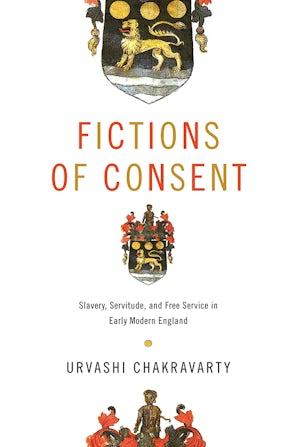
Fictions of Consent
Slavery, Servitude, and Free Service in Early Modern England
by Urvashi Chakravarty
25 halftones
In Fictions of Consent Urvashi Chakravarty excavates the ideologies of slavery that took root in early modern England in the period that preceded the development of an organized trade in enslaved persons.
Despite the persistent fiction that England was innocent of racialized slavery, Chakravarty argues that we must hold early modern England—and its narratives of exceptional and essential freedom—to account for the frameworks of slavery that it paradoxically but strategically engendered. Slavery was not a foreign or faraway phenomenon, she demonstrates; rather, the ideologies of slavery were seeded in the quotidian spaces of English life and in the everyday contexts of England's service society, from the family to the household, in the theater and, especially, the grammar school classroom, where the legacies of classical slavery and race were inherited and negotiated. The English conscripted the Roman freedman's figurative "stain of slavery" to register an immutable sign of bondage and to secure slavery to epidermal difference, even as early modern frameworks of "volitional service" provided the strategies for later fictions of "happy slavery" in the Atlantic world. Early modern texts presage the heritability of slavery in early America, reveal the embeddedness of slavery within the family, and illuminate the ways in which bloodlines of descent underwrite the racialized futures of enslavement.
Fictions of Consent intervenes in a number of areas including early modern literary and cultural studies, premodern critical race studies, the reception of classical antiquity, and the histories of law, education, and labor to uncover the conceptual genealogies of slavery and servitude and to reveal the everyday sites where the foundations of racialized slavery were laid. Although early modern England claimed to have "too pure an Air for Slaves to breathe in," Chakravarty reveals slavery was a quintessentially English phenomenon.